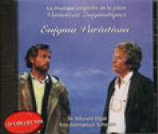Masterclass
Trailers
Monsieur Ibrahim et les Fleurs du Coran
x (x)
x (x)
x (x)
x (x)
x (x)
x (x)
View all trailers
100 Collector cd's available. To order please send a message to gisele.gemayel@bureau-antigone.be
Sir Edward Elgar
Les Editions Scipion n°9801
Ref: Enigma Variations, Scottish National Orchestra, dirigé par Sir Alexander Gibson
La Romance opus 62
Piano: Eric-Emmanuel Schmitt -
Violoncelle: Henri Demarquette
Enigma Theme
Piano: Eric-Emmanuel Schmitt
Salut d’Amour. Chanson de nuit und chanson du matin
Piano: Eric-Emmanuel Schmitt – Violon: Jean-Pierre Audoli
Enigma Nimrod
Piano: Eric-Emmanuel Schmitt
« In this play, there is... »
In this play, there is also that odd work, the Enigma Variations, a symphonic piece from Edward Elgar, who was said to be the innovator of the english music at the beginning of the XXth century.Edward Elgar was born in 1857 in Worcester where is father, a pianotuner, is the owner of a small music shop. Because of family traditions he starts learning piano, violin and organ. And probably also because of family traditions nobody take care about his naturel gifts as a composer, gifts he had since the age of 10, and as a consequence he started his professional career being a solicitor’s clerk. He is just a from time to time musician : he conducts the fanfare of the mental hospital, learning alone with books rules such as the counterpoint and orchestration. He is the arranger of amateur bands and from time to time he jokes writing light works, songs for well-off big old women and tea time dances. Fortunately he meets Alice Robert, daughter of a general officer of the indies army, nine years older than him, giving her accompaniment class. They discover each other, they love each other, and get married. Alice believes in his talent and persuades him that he could become a great composer. Being 40, Edward Elgar, starts working on works as Enigma Variations, The dream of Gerontius, cello concerto…he then becomes the official composer of the king Edouard VII, proposing oratorios, chamber music, symphonic masterpieces and other music such as the famous military marches Pomp and circumstance. Raised, Sir Edward Elgar his now the master of king’s music. But in 1920 his wife dies…he is highly affected. He now feels uncomfortable, useless and stop writing until his death in 1934.The Enigma Variations, works which made him famous worldwide, shows two enigmas. The first one is inside the 14 variations because each variation refers to a friend of his, a friend he musicaly describes without giving any name. Later, as a consequence of Time and success he will reveals the secret of each of them and so now we can see through the music the hidden portraits of his wife, his record producer, etc…. Nevertheless, there is an other enigma, essential, mysterious, a secret Edward never revealed, which is the one of the true theme of the work. He used to say that behind all the variations was an other theme, more important and not played. The pseudo theme heard at the beginning would be too the counterpoint of a famous melody, a very famous melody which would never have been played that way but which print would lead everything. Since 1900, musicologists and musicians are seeking for a solution of the enigma. Even a competition was organised in the US by the Saturday Review in 1953 to find it out. Recently a musicologist from the Netherlands, Théo Van Houten, pretended to have the solution of the mystery : this " bigger "theme, the counterpoint Elgar would have used, would be the melody of " Rule Britania ". That is true that Elgar, who loved playing with words, declared " the main theme never appears " and Van Houten shows that the notes of the hymn on which we sing " never, never " are the four first notes of the theme. But as clever as this solution can be, this is not the problem proposed by Elgar and this solution is nothing but an other brilliant but vain hypothesis. The truth is obscure, tempting, inaccessible. Elgar took it with him in his grave. Only remains conjectures.But what is the matter with it ? That is better for the work because this strengthens it with a heavy silence. And as one of the character of the play says : " what makes this mystery beautiful, it is the secret it contains and not the truth it is hidding. "Eric-Emmanuel Schmitt

